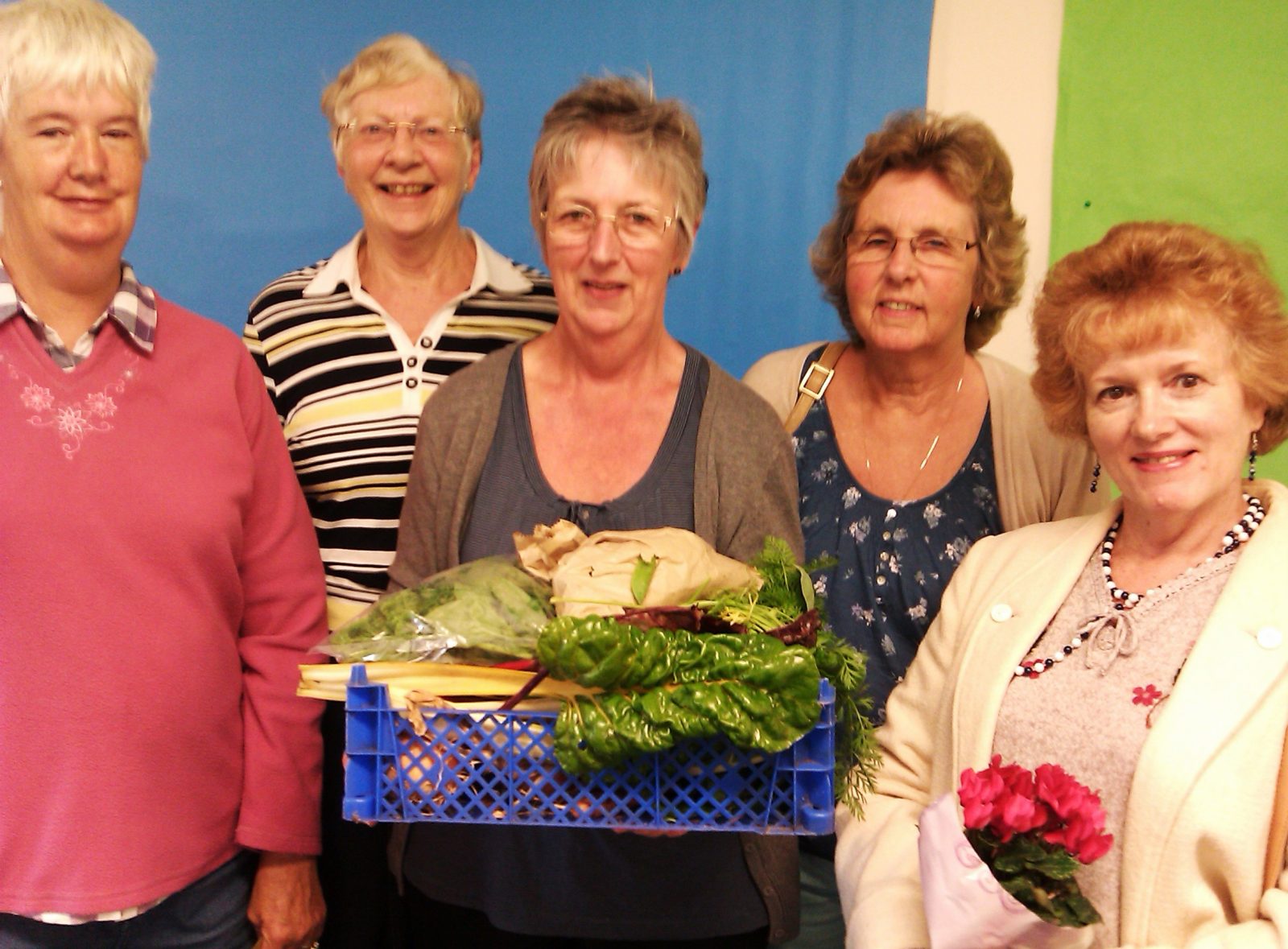
September 10, 2011
Members of Egloshayle Women’s Institute in north Cornwall now know all about our grow-your-own local food project at St Kew Highway.
Camel CSA had the guest slot at the WI’s September meeting in the Egloshayle pavilion, Wadebridge. Afterwards, a small but orderly queue lined up to get membership forms and more details of our weekly veg box scheme. We hope very much they’ll join us.
WI secretary Christine Pearn was the lucky lady who won the raffle to take home our veg box.
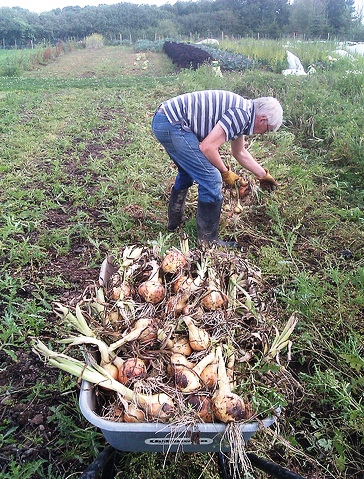
August 20, 2011
Cornwall’s mild, humid climate is proving excessively challenging for Camel CSA’s expert growers and volunteers right now.
Our large crop of onions had to be raised in a hurry as they faced a sudden threat of downy mildew. The same mildew also attacked our salad onions.
Hundreds of onions were lifted over the space of a few days and laid out to dry in our polytunnel next to the basil, coriander, cucumber and rocket beds.
Much of the back-breaking work was done by our amazing secretary Mike Sadler, who’s since been felled by a nasty bout of shingles. We wish him a hasty recovery.
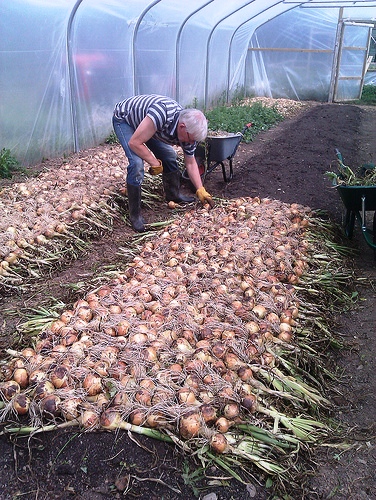
Onion lifting and storing is much more time-consuming than you might think. Luckily we were ably assisted by our bunch of regular volunteers from Hft (the Home Farm Trust) in Wadebridge, which provides support for people with learning disabilities.
At the same time our expert grower Mark Norman had to contend with an attack of blight on the tomatoes in our other polytunnel. Within minutes of spotting the first signs, he’d stripped off all the blight-stricken leaves and saved the crop from disaster.
We’re already reaping the benefits of his quick work in our weekly veg boxes – along with the glut of French beans, cucumbers, basil and podding peas.
Only lots more harvesting and the weeds to tackle from now on, we hope. The weeds are running rife in the carrot, beetroot, squash and pumpkin beds…
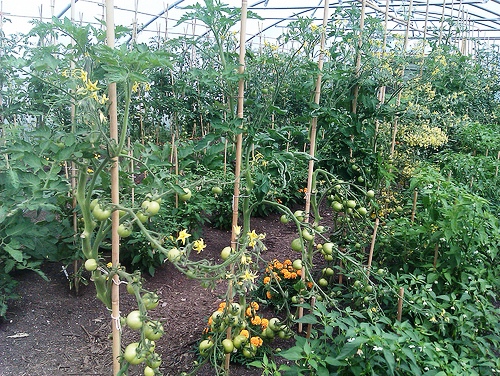
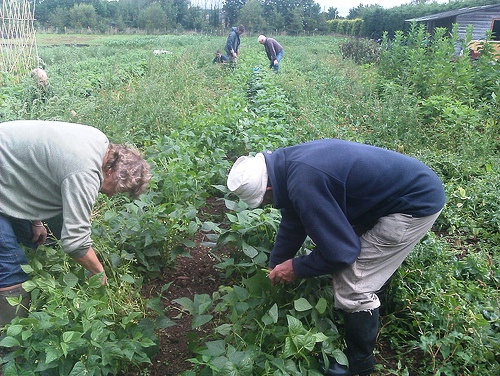
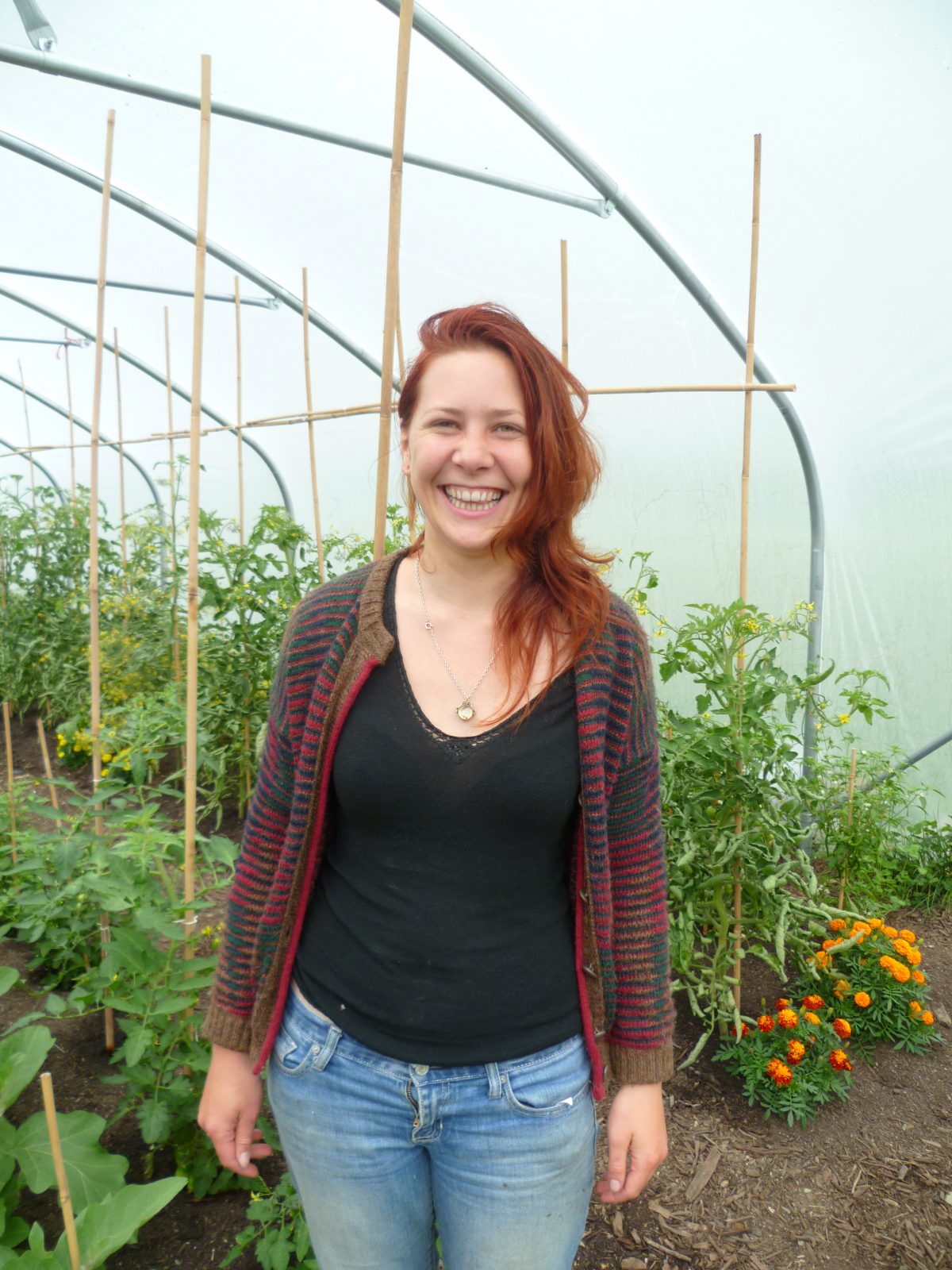
August 14, 2011
Allison Livingstone, Camel CSA’s partnership development co-ordinator says:
There’s a new face around our veg site asking questions and getting stuck in to some volunteering!
Becky Harrison is an action researcher for the University of Exeter and Volunteer Cornwall. She’s started working with us at Camel CSA to develop an understanding of how community groups work and the effect that they have on volunteers and the wider community.
Becky has an MSc in sustainable development and is now studying for a PhD. Previously she worked with the Turtle Foundation and CRISIS, the charity for single homeless people.
Becky’s particularly interested in how people feel about recording their experiences on camera and film as well as talking informally to her. She’s very friendly and is very happy to talk and work at the same time!
You can contact her directly at beckyh@volunteercornwall.org.uk with any questions or for more information.

August 8, 2011
Camel CSA’s weekly veg boxes are overflowing with a bumper harvest from our community vegetable plot in north Cornwall.
We can hardly keep up with the pace of growth. The cucumbers, basil, coriander and rocket in our first new polytunnel are racing ahead.

The tomatoes in the second polytunnel, grown by the lasagne gardening method, are almost ready to harvest.
There are over 100 tomato plants in there, flanked by aubergines, sweet peppers and about 40 chilli plants.
On the field the peas are swelling by the minute, while the first of the outdoor french beans and mange tout peas will be available in the boxes this Friday.

We’ve at long last picked all the broad beans.
The brassicas are also doing brilliantly – calabrese, summer sprouting broccoli and purple kale. We’ve even managed to grow some mouth-watering kohlrabi!
Unfortunately the alternate sunshine and showery weather means it’s a good year for weeds as well –
and it’s proving difficult to keep up wth the weeding as so many of our regular volunteers are away on holiday.

Next year we’re determined instigate a strict mulching regime to enable us to manage the growth and keep them at bay.
But at least we’ve been able to start drying out our vast crop of onions.
Watch the video: How Camel CSA is helping make local food work
June 22, 2011
Camel CSA’s contribution in Cornwall to Making Local Food Work is featured in a new YouTube video commissioned by the Plunkett Foundation, made by eclips film.
We turned our grow-your-own dream into reality with the support and guidance of the Soil Association via Making Local Food Work. We have £60,000 funding from the Big Lottery’s Local Food programme and the East Cornwall Local Action Group (part of the South West Regional Development Agency).

June 13, 2011
Isn’t it cute?! This is the new little red tractor bought at the Royal Cornwall Show for our community veg plot at St Kew Highway.
We sent a small team to the show to look for one, led by expert grower Mark Norman. They had such fun choosing it – a TAFE 35 DI classic, built in India.
Now we can’t wait for the tractor to be delivered.
It was paid for out of our £49,000 grant funding pot from the Big Lottery Fund’s Local Food Programme.
Thank you Big Lottery!
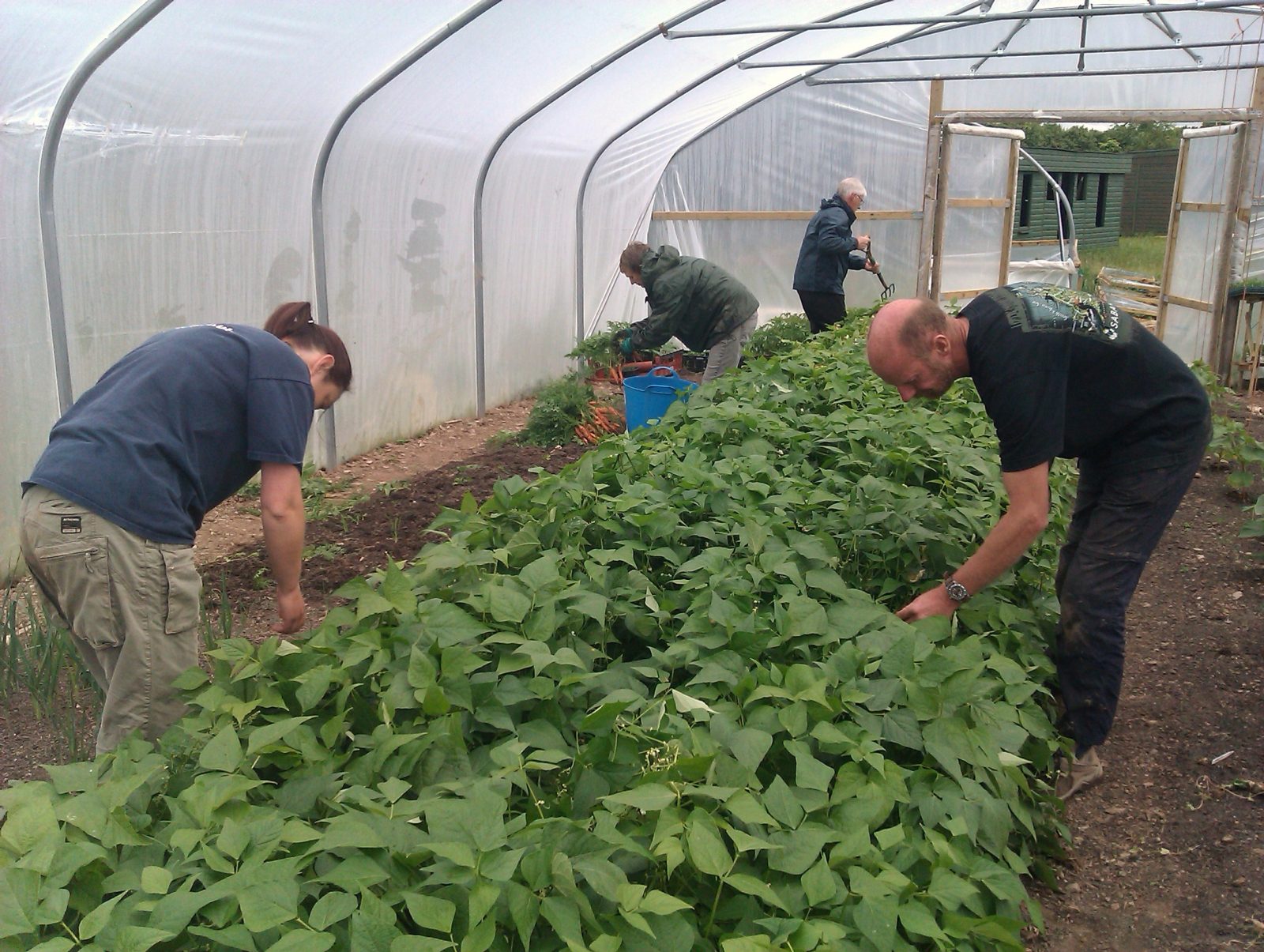
June 11, 2011
What a difference the new polytunnels are making!
The contents of this week’s seasonal veg boxes came almost exclusively from Camel CSA’s own plot.
Expert grower Mark Norman supplied us with broad beans and green onions from his smallholding in Bodmin. Richard Hore provided Cornish new potatoes grown in his fields above the Camel estuary.
When it comes to making local food work, you can’t get much more local than that.
The volunteer growing team have a variety of jobs to get through this Sunday morning. We need to: –
- Mark out and form the third lasagne bed in the new polytunnel and plant two rows of tomatoes
- Weed the second brassica bed
- Prepare the second sweetcorn bed and move the sweetcorn seedlings to the cold frame
- Dig the remaining holes in the squash beds and fill each one with two shovelfuls of compost (the rest of the pumpkins and squashes will get planted later in the week)
- Plant the dahlias beside the squashes
- Sow a tray of cabbage, half a tray each of calabrese and turnips (six turnip seeds per module)
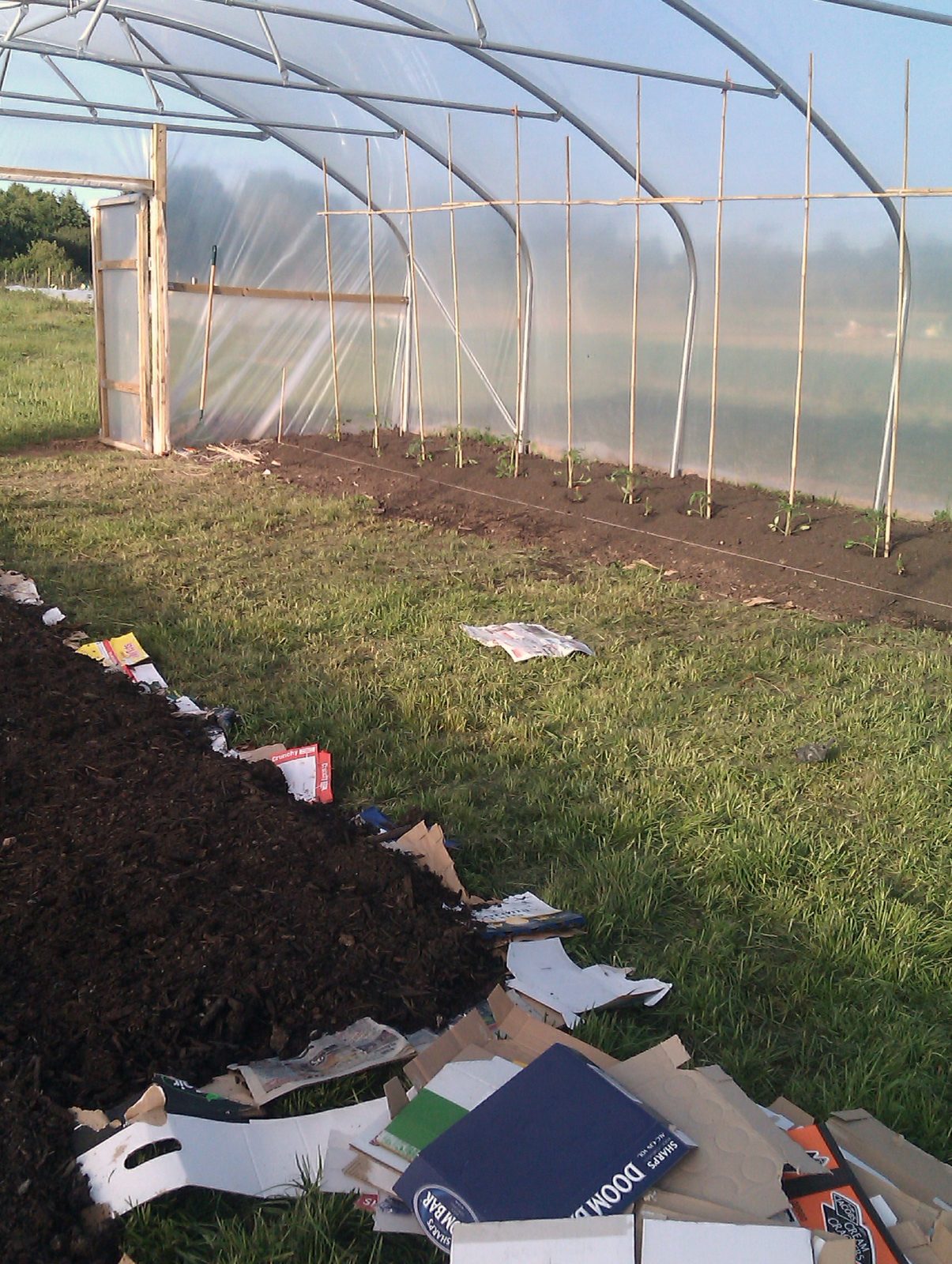
June 8, 2011
The ground inside our new polytunnel is rock hard as a result of the prolonged dry spell in Cornwall. So it’s proved too difficult to dig deeply by hand to prepare for planting the tomatoes and peppers.
That’s why we’re experimenting with a no-dig method known in the United States as lasagne gardening.
This permaculture approach involves placing cardboard on the ground to suppress the weeds, watering it thoroughly and then covering it with newspaper and thick layers of compost or other organic material.
We’re planting the tomatoes and peppers directly into the compost and a hole is being pierced through the cardboard so the plants’ roots get access to the earth underneath.
All being well, there will be lovely friable soil once the cardboard has rotted down at the end of the season.
So watch this space!
- Special thanks to Joe and Laura Brown at St Mabyn PO & Stores for all their recycled cardboard
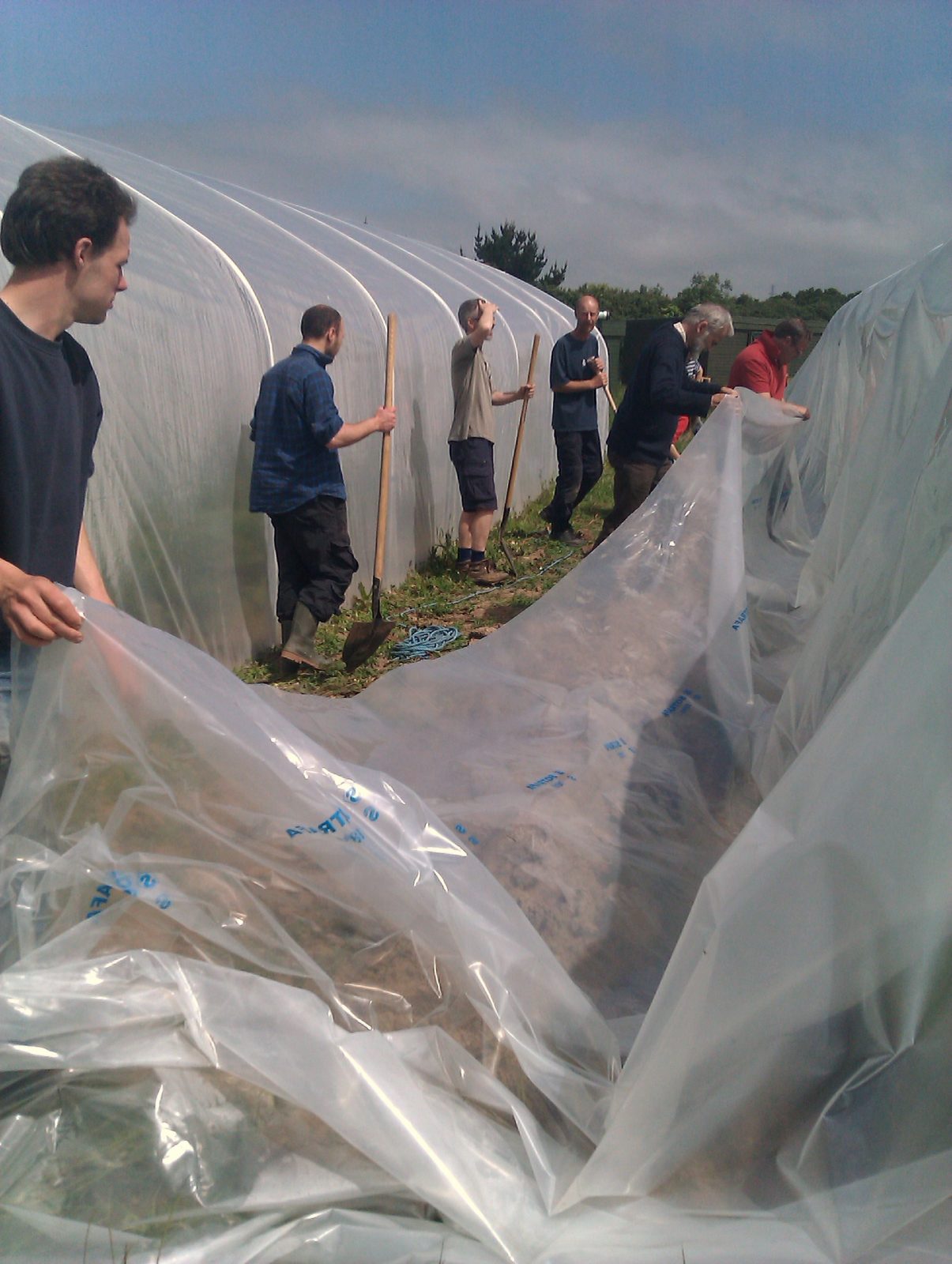
June 5, 2011
Camel CSA has now got two polytunnels. At long last we have a home for our tomatoes and peppers.
Our first polytunnel went up in March and is already nurturing our early crops of beetroot, basil, salad leaves, carrots, lettuce, French beans and leek seedlings.
We had to wait weeks for a calm, wind-free day (almost unheard of in Cornwall!) to get the cover on the second tunnel. With barely 24 hours notice we raised a team of six volunteers aided by three helpful WWOOFers – Willing Workers On Organic Farms.
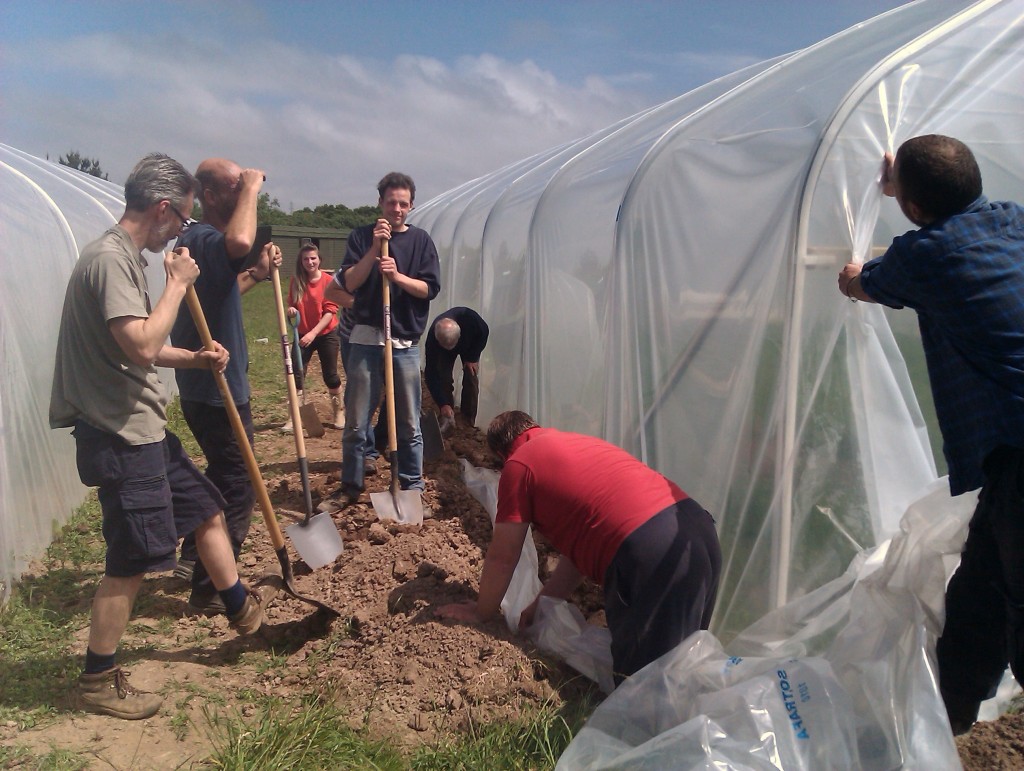
Many thanks to expert grower Mark Norman, ably helped by Bob, Charlotte, Mark M, Mike S, Penny, Robert and an opportune visit by the Rev Dave Matthews (who’s very tall!) The WWOOFers are Matthias from Germany, and Kevin and Martina from Italy.
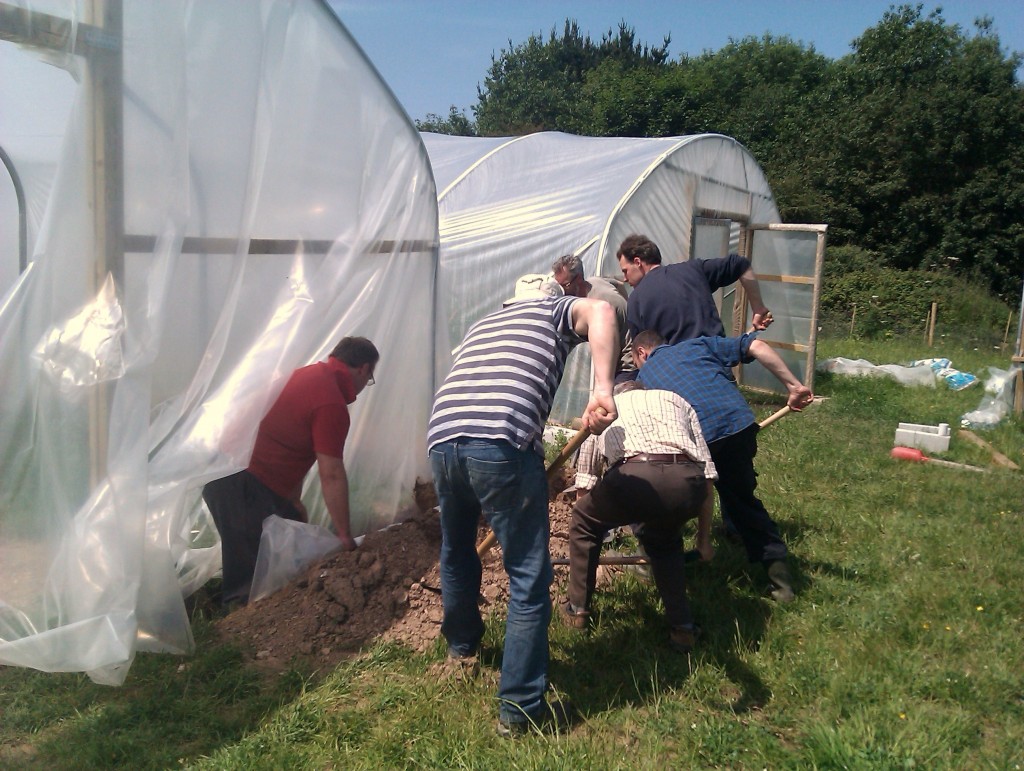
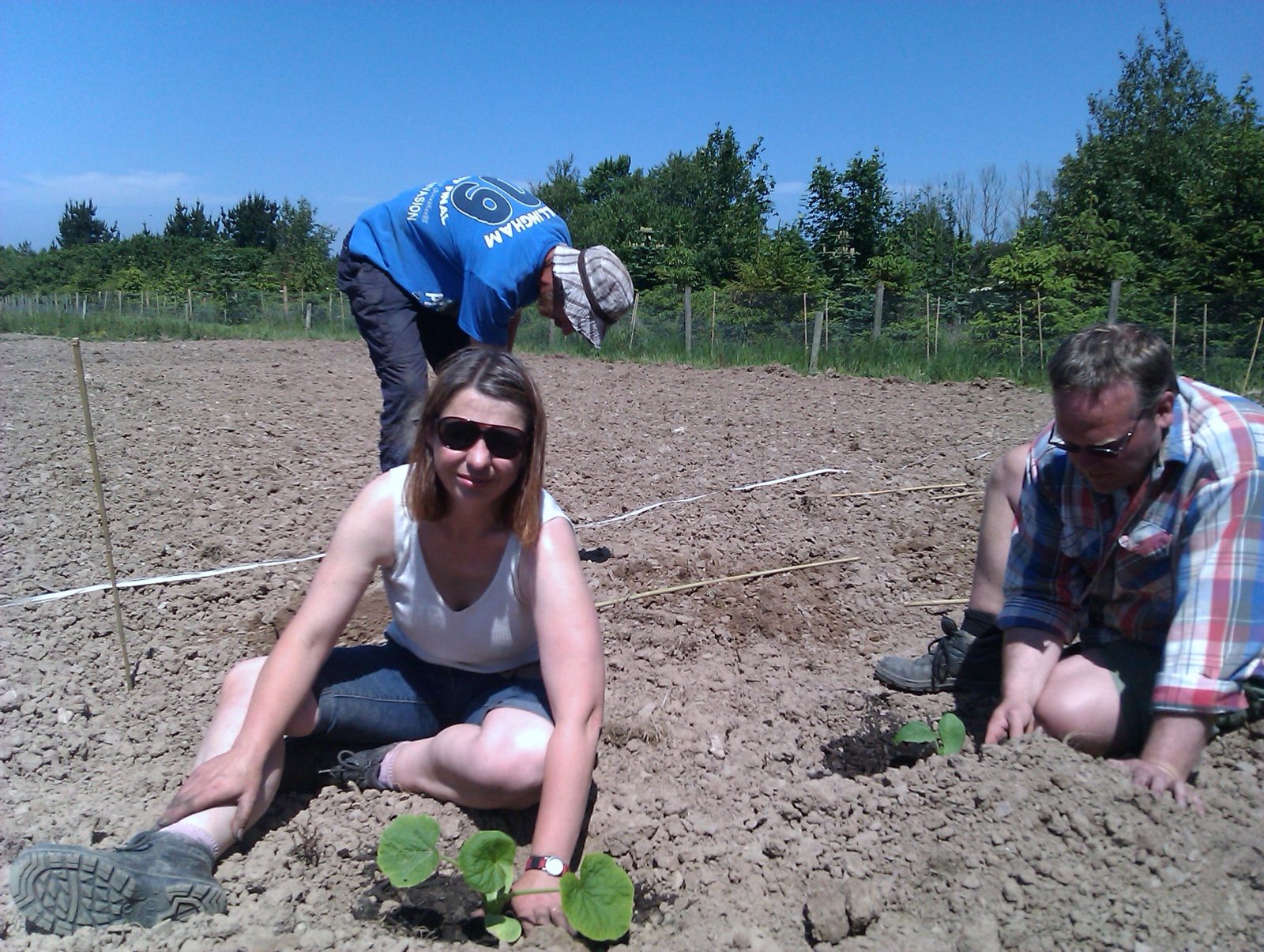
June 4, 2011
Our growing team are going to be busy this weekend on our community veg plot at St Kew Highway.
Expert growers Mark N and Bridget, along with Bob and five-year-old Max, planted out hundreds of pumpkins and squashes in hot Cornish sunshine on Friday.
The high temperatures in Cornwall mean we have to keep a close eye on the polytunnel and cold frames. We must keep watering the baby beetroot, carrots, leek seedlings, french beans, cucumbers and basil in the tunnel, along with the seedlings in the cold frames, and the brussel sprouts and kale outside.
Our Sunday volunteers also need to: –
- Plant out spring onions, purple sprouting broccoli (Rudolph) and dahlias
- Feed the calabrese and stonehead cabbage seedlings and move them into the cold frames
- Weed the broad beans, parsley and celeriac
- Compost the next root bed
- Cut the grass
Phew!


